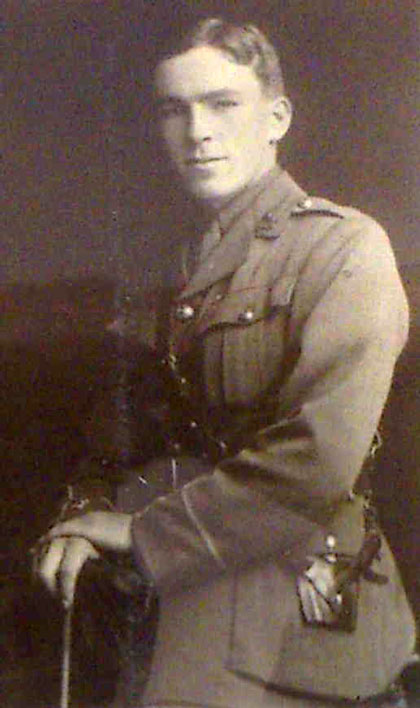![]() In memoriam
In memoriam ![]()
Second Lieutenant John William McVicker
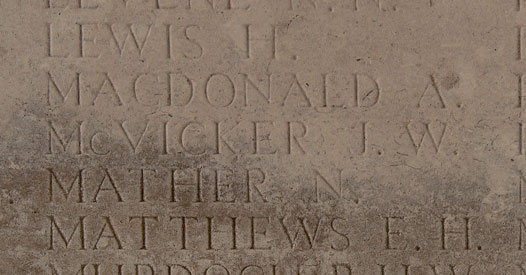
John William McVicker was born on 15 April 1895 at Craignamaddy, Croagh, County Antrim, the fifth of nine children of farmer William James McVicker and his wife Matilda Ann (nee Morrison).
McVicker was educated at Coleraine Academical Institution, playing in the First XV (rugby) and hockey, before beginning a medical degree at Edinburgh University in 1913.
On the outbreak of war he applied for a commission, at the same time enlisting in the North Irish Horse (regimental number and exact date of enlistment not known at present). On 16 November 1914 he was commissioned as a 2nd lieutenant and posted to the 13th (Service) Battalion, King's (Liverpool Regiment). He embarked for France with the battalion on 26 September 1915.
On 14 July 1916 the 13th Battalion, part of the 3rd Division, was thrown into the fighting on the Somme, with orders to capture and clear the village of Bazentin-le-Grand. This they did, though only after sustaining heavy casualties. Their total losses during this and subsequent fighting that month were 9 officers killed, 13 wounded and 1 missing, and 128 other ranks killed, 296 wounded and 75 missing.
The battalion's report of the day's fighting notes "very heavy" officer casualties. One of these was 2nd Lieutenant McVicker. His burial place was subsequently lost or forgotten, and he is commemorated on Pier 1, Face C, of the Thiepval Memorial, Somme, France.
Later that month the Coleraine Chronicle reported:
The tragic effects of this awful war have been brought home very forcibly to many Ulster people since the great Allied offensive began on July 1st. The best blood of the Imperial province has been freely giving its quota to soak further the sonnen ridges that lie across the English Channel. Among the latest to fall in action has been John W. McVicker, Second-Lieutenant King's (Liverpool) Regiment, third son of the late Mr. W. J. McVicker, R.D.C., and Mrs. McVicker, Craignamaddy, Mosside. The gallant young officer, whose demise is so much regretted, volunteered his services at the very beginning of the great war in 1914.
The late officer was educated at the Coleraine Academical Institution, where he had a most successful career; his fine qualities of head and heart endeared him to masters and class-mates alike. He took a prominent part in manly sports of all kinds, and was especially well-known in hockey circles in the north. In 1913 he entered to Medical School of Edinburgh University, where he had just completed his first year, and was enjoying his well-earned vacation when hostilities broke out. In all his educational career he displayed fine talents, and these, combined with his persevering nature, would undoubtedly have secured for him high honours in the profession he had chosen for his life work. Like many other university men, he applied for a commission, and not wishing to wait inactively while his application was being considered, he enlisted as a trooper in the North Irish Horse. His commission being readily forthcoming, he was posted to a service battalion of the King's (Liverpool) Regiment in November, 1914. He was on duty with his battalion in various parts of England from this time until September, 1915, when he sailed for the nearest theatre of war, from which place it has now been officially intimated that he was killed in action on the 14th inst. He had thus at the time of his death given ten months of active and efficient service – his very best – for King and country. It appears that he displayed special aptitude for bomb-throwing, and that some time ago he was appointed bombing officer in his battalion. He paid two visits to his native place direct from the trenches, the last of these being made six weeks ago. Of a bright and cheerful disposition, he never complained of the hardships of campaigning, and was always in excellent spirits. He was very highly esteemed by the men under his command, whether on training ground or battlefield, and rightly so, for their safety and comfort was ever his chief concern; on several occasions he refused presents from friends for himself, asking them to substitute gifts which he could distribute among his men. It can well be imagined that his death will be lamented by none more sincerely than by these brave men whom he so tenderly cared for and so brilliantly led, for although no details are yet available as to how he fell, those who knew "John," as he was affectionately called, know well that his last duty, like all others, was nobly and faithfully performed. In a letter to his brother a few days before the end he showed with what a fine spirit he viewed the coming terrific struggle; he said, "I am entering into the fight with a light heart, feeling that we are fighting for God as well as King and country. If the worst happens, however, as Horace says, 'Dulce et decorum est pro patria mori.' I am quite optimistic though." The line of Latin poetry means, "It is sweet and glorious to die for one's country."
There are two brothers of deceased serving with the colours – Captain D. McVicker, R.A.M.C., who has been on active service since the beginning of the war, and Lieutenant S. McVicker, London Regiment, at present on special duty at Winchester.
Further details were revealed in an article in The Newsletter of 23 July 2010:
One of John's letters, written to his mother from the trenches on the May 23, 1916, reveals nothing of the harsh dangers he was facing.
"Dear Mother, just a few lines to let you know that I am quite well," adding, as of on holiday; "The weather here is fine, but we get spells of rather wet weather at times."
John died two months later, on the same day that his mother sent him a parcel of home-cooked biscuits. His brother Dan, a doctor in the medical corps, was awarded a Military Cross for pulling wounded soldiers from the scene of an explosion in France.
Dan rescusitated several of the men, in full view of the enemy. When time permitted, Dr McVicker went looking for news of his brother, who had apparently been injured.
"My Dear Mother," Dan wrote. "I went in search of Johnny last Friday and you may guess the shock I got when I found his wagon line and was told that he'd been killed.
"He is buried in a shell hole. There is a small cross on it but I'm going to get a better one sent up. He was killed on Friday morning July 14, on the same day as you sent the parcel."
Another letter ... was written to Mrs McVicker of December 7 1916, from an army chaplain.
"Dear Mrs McVicker, will you accept the enclosed copy of my address at the memorial service for your gallant and beloved son."
On the morning of the day he was killed, John had been wounded, but refused to fall back.
A German bomb landed among the men. He picked it up and attempted to throw it back towards the enemy, an action that he'd already carried out successfully on a number of occasions. This one exploded and he died instantly, saving the lives of those in the vicinity.
McVicker's two older brothers also served during the war: Daniel, as a captain in the Royal Army Medical Corps, was awarded a Military Cross and mentioned in despatches; and Samuel, as a captain in the 19th Battalion, The London Regiment.
After the war three of his brothers played rugby for Ireland: James, with 20 caps between 1923-24 and 1929-30; Hugh, with five caps between 1926-27 and 1927-28; and Samuel, with four caps in 1921-22.
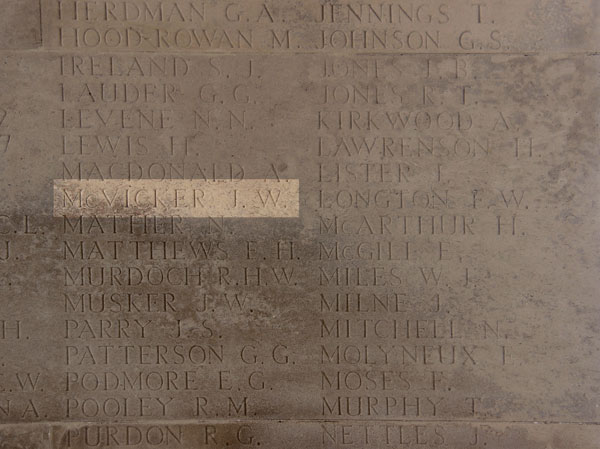
Thiepval Memorial
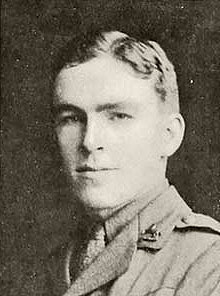
University of Edinburgh Roll of Honour 1914-1919
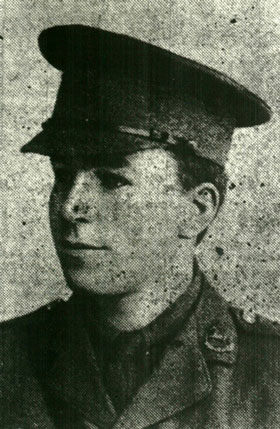
Coleraine Chronicle, July 1916
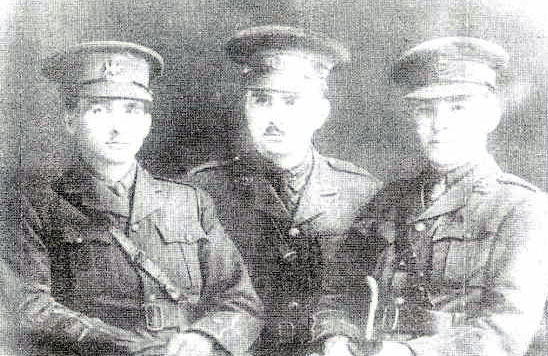
Samuel, Daniel and John William McVicker
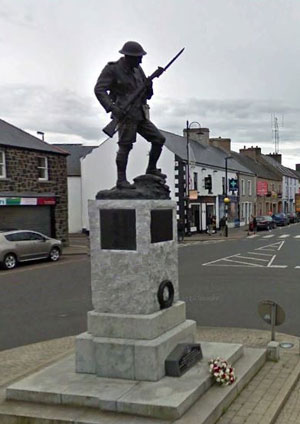
Bushmills Memorial

Bushmills Memorial
First and sixth images and article from The Newsletter sourced from Ancestry Public Trees - Adam Stebbings. Second and third images kindly provided by Steve Rogers, Project Co-ordinator of the The War Graves Photographic Project, www.twgpp.org. Fifth image and article from the Coleraine Chronicle kindly provided by Nigel Henderson, Researcher at History Hub Ulster (www.greatwarbelfastclippings.com). Seventh and eighth images sourced from the Irish War Memorials site. Fourth image sourced from the National Library of Scotland.

